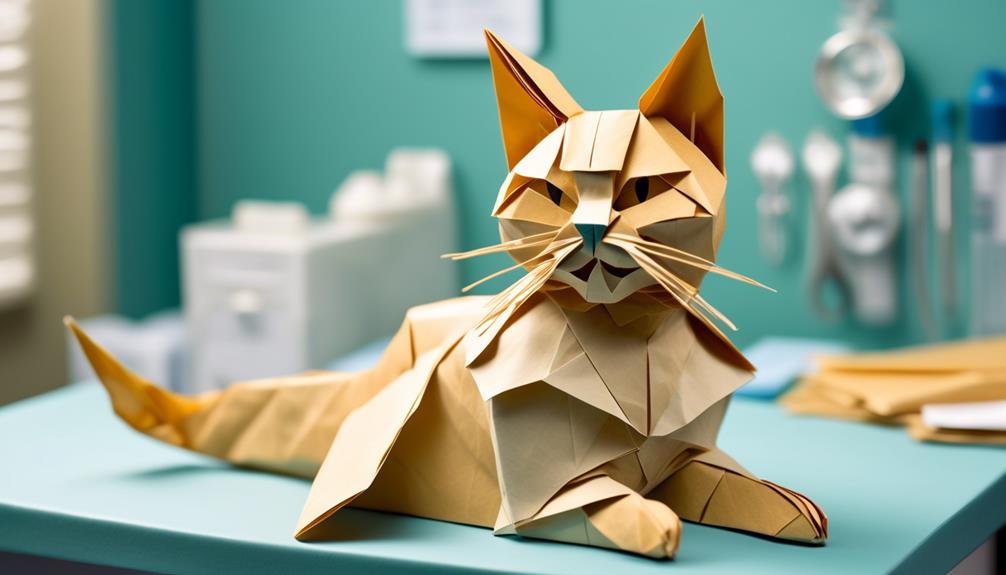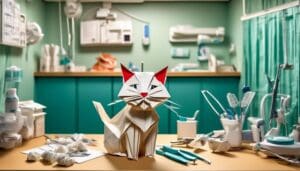Preventing dental issues in your aging cat is crucial for their health, emphasizing the importance of caring for your beloved pet as they grow older.
Dental cleanings are crucial for preventing health problems caused by poor dental hygiene, especially as cats age and their immune system weakens, increasing their risk of dental diseases that can cause pain and lead to significant health issues.
By ensuring your cat receives regular dental care, you’re not just polishing their pearly whites; you’re safeguarding their overall well-being. As you consider the comfort and longevity of your cherished pet’s life, ponder how a commitment to dental hygiene can enhance their golden years.
Let’s look at the important but frequently ignored advantages of dental cleanings for elderly cats.
Key Takeaways
- Regular dental cleanings are essential for older cats to prevent dental issues and maintain their overall health.
- Neglecting dental care can lead to a decreased quality of life for senior cats.
- Anesthesia and safety measures are important during dental cleanings for older cats.
- Dental X-rays play a vital role in diagnosing hidden dental problems and ensuring comprehensive dental care for older cats.
Recognizing Dental Issues
It’s important to closely observe your senior cat for dental problems since they hide pain well. Look for minor behavior or eating changes. Dental issues, more than causing bad breath, pose a significant health risk, impacting their quality of life. Tartar buildup can cause gingivitis and periodontal disease, damaging tooth enamel.
You might observe your cat becoming more withdrawn or less interested in playtime. They may also start to favor one side of their mouth while eating or suddenly prefer softer foods. These could be signs of pain from dental issues like Feline odontoclastic resorptive lesions, a condition where the tooth enamel is eroded, leaving the sensitive inner parts of the tooth exposed.
Don’t wait for your cat to show obvious signs of pain, as they tend to endure in silence. Regular veterinary check-ups are essential in catching dental problems early on. By doing so, you’re not just ensuring their mouth stays healthy, but you’re also safeguarding their overall well-being. Remember, they rely on you to speak up for their health, and you’ve got the heart and the knowledge to do just that.
Benefits of Regular Cleanings
Regular dental cleanings offer a world of relief for your senior cat, easing discomfort and potentially restoring their zest for life. As a caregiver, you’re in a unique position to provide the best for your older cats, and part of that’s ensuring they receive regular dental care. A professional dental cleaning can be a transformative dental procedure for your cat.
Here’s how regular dental cleanings can benefit your senior cat:
- Alleviates Pain: Dental cleanings remove tartar and plaque buildup that can cause significant pain and discomfort.
- Boosts Appetite and Energy: After dental cleaning, your cat may show an increase in energy and a renewed interest in mealtime.
- Prevents Serious Health Issues: Extracting infected teeth during the dental procedure can prevent complications that affect overall health.
- Improves Quality of Life: Regular dental care ensures your cat remains comfortable and happy in their golden years.
- Contributes to Overall Health: Clean teeth and healthy gums can improve your cat’s well-being, making regular dental a cornerstone of their health routine.
Embracing the importance of dental cleaning for your older cats shows a deep commitment to their health and happiness. It’s a way to say ‘I care’ without words, ensuring they live out their later years in comfort and joy.
Risks of Neglected Teeth
Neglecting your cat’s dental care can lead to oral diseases, causing them significant pain and lowering their quality of life.
Regular dental check-ups are essential to catch these issues early and keep your cat’s purrs of contentment genuine and pain-free.
Oral Disease Consequences
When dental care is overlooked, your older cat risks developing periodontal disease, which can lead to serious systemic infections and compromise vital organ functions. It’s heartbreaking to see a beloved pet suffer because significant dental issues weren’t addressed early on. Remember, preventative care through dental procedures can spare your cat from pain and safeguard their health.
- Chronic discomfort from Feline odontoclastic resorptive lesions can make every meal a painful ordeal.
- Bacteria in the mouth can spread, posing risks of anesthesia during emergency dental work.
- Inflamed gums and affected teeth may result in tooth loss, affecting their grooming habits.
- Systemic infections can damage the heart and kidneys, shortening their precious time with you.
- Regular dental cleanings help keep your cat healthy and happy.
Decreased Quality of Life
Neglected dental care in older cats can diminish their quality of life, leading to persistent discomfort and a host of health issues. When you overlook their dental needs, you’re not just neglecting their teeth; you’re affecting their entire being.
Here’s a concise overview of the risks:
| Condition | Consequence | Impact on Cat |
|---|---|---|
| Tartar Build-Up | Gum Disease | Pain, Discomfort |
| Untreated Disease | Organ Damage | Systemic Health Issues |
| Difficulty Eating | Weight Loss | Decreased Vitality |
| Neglect | Expensive Treatment | Financial Burden |
Anesthesia Safety Considerations
You want to ensure the dental cleaning for your cat is safe.
That’s why it’s essential to have a thorough preanesthetic health screening to tailor the anesthesia to your older cat’s specific needs.
With careful monitoring and the right supportive measures, the risks associated with anesthesia can be reduced, ensuring a smooth procedure for your cherished pet.
Anesthesia Risk Assessment
Understanding the risks associated with anesthesia is vital in safeguarding your senior cat’s health during dental cleanings and procedures. As you prepare for your cat’s dental, it’s important to approach anesthesia risk assessment with a gentle touch and thorough consideration.
Here are some key factors to keep in mind:
- Pre-Procedure Blood Work: Essential for evaluating your cat’s overall health and suitability for anesthesia.
- Tailored Anesthetic Plans: Customized to your senior cat’s specific health requirements.
- Monitoring During Procedures: Ensures your cat’s vital signs remain stable throughout the teeth cleaning.
- Dental X-Rays: Invaluable for a comprehensive Oral Health assessment under anesthesia.
- Routine Dental Check-Ups: Help reduce the frequency and complexity of anesthesia in the future.
Your commitment to your cat’s well-being is commendable, and these actions will ensure their safety and comfort.
Pre-Procedure Health Screening
Before your beloved cat undergoes dental cleaning, a thorough pre-procedure health screening is essential to ensure the safest possible anesthesia experience. Getting their teeth cleaned isn’t just about a brighter smile—it’s about their health. Blood tests are the cornerstone, revealing any underlying issues that could complicate anesthesia.
Here’s a veterinarian-approved checklist to guide you through the screening process:
| Screening Test | Importance |
|---|---|
| Blood Tests | Evaluates overall health |
| Heart Ultrasound | Assesses cardiac risk |
| Anesthesia Type | Tailors safest method |
| Tartar Assessment | Determines complexity |
| Lesion Check | Identifies feline odontoclastic resorptive lesions |
Each step helps manage the risks, with heavy tartar or extensive dental work needed. Your vet’s expertise ensures a compassionate path through these necessary precautions, safeguarding your treasured cat’s well-being.
Pre-Cleaning Evaluation
Ensuring your older cat’s well-being, a veterinarian will conduct a detailed dental exam to determine the necessity of a cleaning. This initial step is both compassionate and essential, as it uncovers any underlying conditions that might affect your beloved cat’s oral health. Remember, their comfort and safety are always the priority.
During this pre-cleaning evaluation, the veterinarian will look for signs of Feline odontoclastic resorptive lesions, which can cause significant pain and may require that teeth are extracted. Dental X-rays play a vital role in this assessment, offering a glimpse below the gumline—where the most serious issues often lurk unseen.
Here’s what you can expect during the pre-cleaning evaluation:
- Thorough Oral Examination: To identify any dental issues or potential concerns.
- Dental X-rays: To detect hidden problems and plan for dental scaling or extractions.
- Bloodwork: Ensuring anesthesia is safe for your senior cat.
- Anesthesia Monitoring: To keep your cat comfortable and still during the procedure.
- Customized Treatment Plan: Tailored to address specific dental needs, including recommendations for brushing your cats’ teeth with veterinarian-approved products.
The Cleaning Process Explained
Dental cleanings for older cats are carefully managed to prioritize their comfort and health, including safe anesthesia practices.
We’ll walk you through the steps of dental cleaning, so you know exactly what to expect and how you can support your cat’s dental health.
Steps in Dental Cleaning
To safeguard your senior cat’s health and comfort, the dental cleaning process begins with anesthesia, which allows for a comprehensive examination and the necessary dental X-rays.
- Thorough Evaluation: A dental probe checks for gum bleeding and periodontal pockets; dental X-rays reveal the extent of any dental disease, including feline odontoclastic resorptive lesions.
- Tartar Removal: Tooth scaling is meticulously performed to clear tartar, using both hand scalers and ultrasonic technology above and below the gum line.
- Polishing: Teeth are polished, creating a smooth surface that discourages plaque accumulation.
- Dental Sealant: A veterinarian-approved sealant may be applied to teeth to further protect against plaque build-up.
- Aftercare: Preanesthetic tests, potential antibiotic treatment, and a solid at-home dental care regimen are essential to maintain your cat’s oral health post professional dental cleaning.
Anesthesia and Safety Measures
For your senior cat’s dental cleaning, every precaution is taken to make sure the anesthesia process is safe and comfortable for them. We carefully plan and personalize the anesthesia and safety protocols to meet your cat’s specific needs, ensuring they receive the highest standard of care during this important procedure.
Advanced dental care, including the management of Feline odontoclastic resorptive lesions, relies on this attention to detail.
Veterinary professionals will closely monitor your cat’s blood pressure and other vital signs throughout the procedure, adjusting anesthesia as needed. Dental X-rays, essential for assessing the condition below the gum line, are safely conducted under anesthesia.
This comprehensive approach ensures your senior cat emerges from their dental cleaning healthy and more comfortable.
Post-Cleaning Recovery Tips
After your cat has had a dental cleaning, it’s crucial to monitor them closely for any signs of discomfort or pain while they recover. Their mouth might be sensitive after having tartar removed, and it’s particularly important to make sure they are comfortable if they had any teeth extracted or if they were treated for feline odontoclastic resorptive lesions.
Here are some veterinarian-approved tips to help your cat recover smoothly and maintain their precious adult teeth:
- Offer Soft Food: Provide soft, easy-to-chew foods to avoid stressing their teeth.
- Pain Management: Administer any prescribed pain relief to alleviate discomfort.
- Monitor Behavior: Keep an eye on your cat’s behavior and appetite changes — they can indicate how well they’re healing.
- Check for Blood: A little blood is normal, but persistent bleeding warrants a call to your vet.
- Follow-Up Visits: Schedule regular check-ups to monitor healing and prevent future dental issues.
Your cat relies on you for care and comfort. Gentle attention during this time can make all the difference. By serving their needs with a tender approach, you’re not just looking after their dental health — you’re also nurturing the bond you share.
Dental Cleaning Frequency
Having tended to your cat’s comfort post-cleaning, it’s also vital to consider how often these dental cleanings should be part of their care routine. Your beloved cat deserves the best of care, and maintaining their dental health is a cornerstone of their overall well-being. As the years grace your cat with wisdom and poise, regular tooth cleanings become increasingly important to prevent tartar buildup and ensure their mouth remains a haven of health.
Ideally, after your cat reaches the age of 2 or 3, a visit to the vet for a dental assessment every 1 to 2 years can keep potential issues at bay. Gentle prophylaxis, when performed before signs of dental disease emerge, can prevent or even delay the onset of conditions like feline odontoclastic resorptive lesions, a common yet painful dental affliction in cats.
Home Dental Care Strategies
Your cat’s sparkling smile isn’t just for show; regular home dental care is essential for staving off disease and keeping them happy and healthy. Just like with your own teeth, tartar and tooth decay can creep in without proper attention, and older cats are prone to Feline odontoclastic resorptive lesions, a painful condition affecting cats’ teeth. But don’t worry, with gentle and consistent care, you can play a pivotal role in maintaining your cat’s oral health.
Consider these compassionate strategies to care for your beloved cat’s teeth:
- Brush their teeth regularly: Use a soft-bristled toothbrush and pet-safe toothpaste to gently clean your cat’s teeth, reducing tartar buildup and the risk of tooth decay.
- Dental treats and toys: These can be a fun way to help scrape away plaque and freshen their breath.
- Balanced diet: Feeding them the right food supports overall health, including dental well-being.
- Veterinary-approved products: Look for rinses or gels specifically designed for cats to help maintain oral hygiene.
- Professional cleanings: Schedule these as recommended by your vet to prevent serious dental issues.
Choosing the Right Veterinary Dentist
While you’re nurturing your older cat’s dental health at home, it’s important to select a veterinary dentist who’ll provide the expert care they deserve.
When tartar builds up on the tooth surface, it’s not just about cleaning – it’s about protecting your beloved pet from potential pain and complications like Feline odontoclastic resorptive lesions.
The right veterinary dentist will have a wealth of experience and a gentle touch, when dealing with the delicate needs of senior cats. They’ll have veterinarian-approved protocols to ensure safety, particularly with anesthetic plans tailored for older pets. Your cat isn’t just any patient; they’re a cherished family member, and their comfort and well-being are paramount.
Seek out a dental professional who also values the importance of dental X-rays. This tool is indispensable for assessing the hidden parts of the teeth and gums, revealing issues that might go unnoticed otherwise. If advanced periodontal disease is present, your vet should be skilled in procedures such as tooth extractions, offering relief and preventing further deterioration.
Frequently Asked Questions
Should Older Cats Have Their Teeth Cleaned?
You should definitely consider dental cleanings for your older cat. It’s a caring step to minimize discomfort and protect their health, ensuring they stay happy and comfortable in their golden years.
Does My Cat Really Need a Dental Cleaning?
Absolutely, your cat needs a dental cleaning. Over 70% of cats develop dental disease by age three, so regular cleanings are key to keeping them healthy and pain-free in their golden years.
Is It Safe for Old Cats to Have Teeth Removed?
Removing your old cat’s bad teeth can be safe and significantly enhance its quality of life when done under a vet’s careful supervision.
Is Dental Treatment Necessary for Cats?
Dental treatment is essential for your cat’s health, preventing pain and disease. It’s a kind gesture that ensures their comfort and well-being, reflecting your care for their quality of life.




